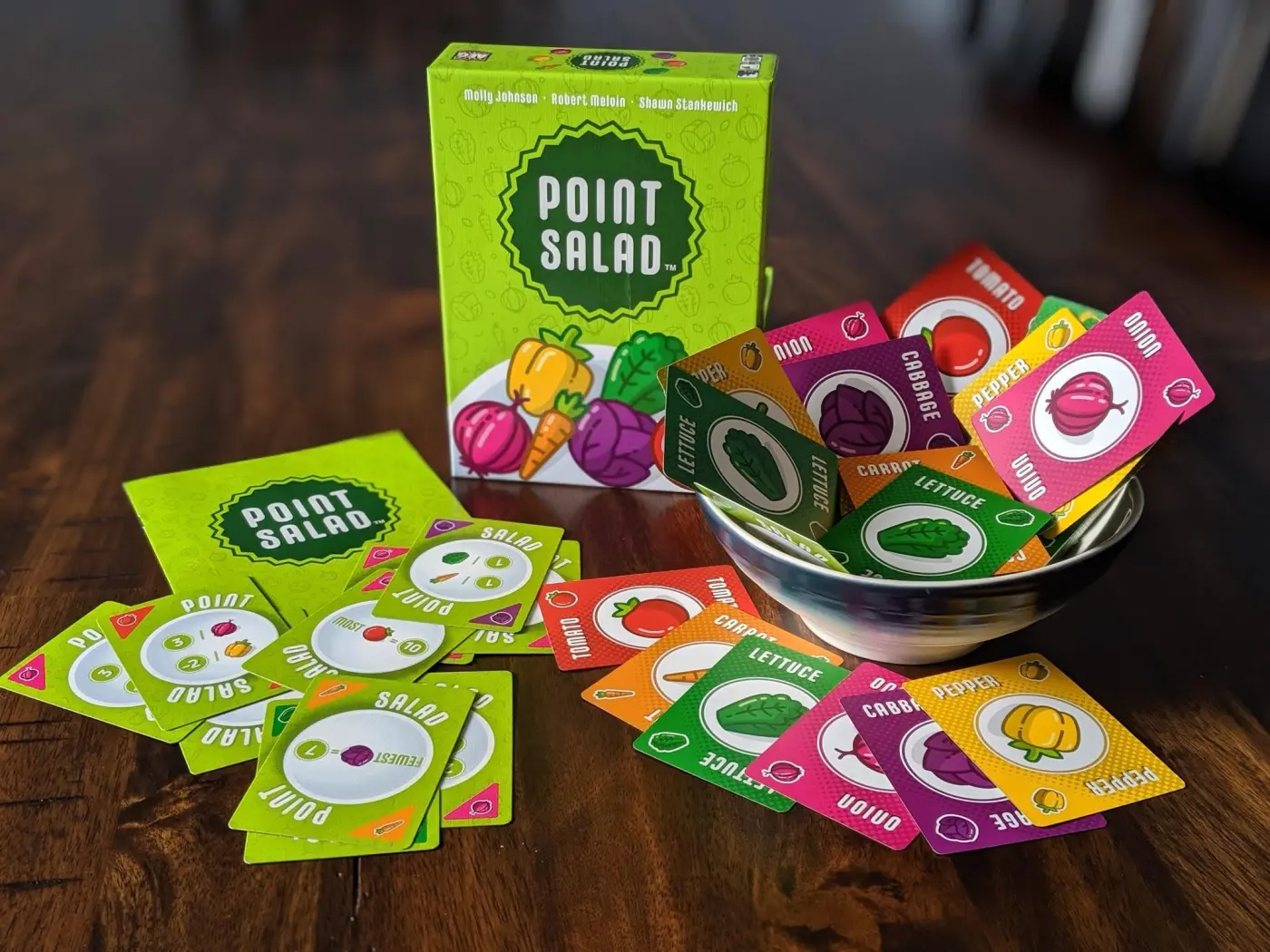Point Salad is a multiplayer game centered around one core mechanic: scoring as many points as possible with your acquired vegetables. With six different vegetables acting as suits, players must strategically select which vegetable combos to go for, described by point cards that assign a different point value for each vegetable combination (for example: every pair of one tomato and one lettuce might be two points, every carrot might be worth one point, etc.). A turn of play is composed of each player drawing either two cards available in the market and in the point card deck (one of each, or two market picks or two point card deck picks). Point cards also have assigned suits, and can be flipped to become a basic vegetable suit card. Thus, for each turn, players are juggling several choices, strategically conducting their draw picks based on what vegetables they need, what new combos capitalize on their already acquired vegetables, and which vegetables they should keep from their opponents. The game ends once all the cards from the deck are exhausted, at which point the point tallying begins.
Point Salad as a game is… inoffensive. The core mechanic and gameplay are incredibly easy to pick up, and the visual aesthetic of the game is playful and charming, akin to classic Melissa & Doug play foods. As simple as the gameplay is, it is not exactly one-tracked and mindless: players must keep an eye on the combinations and vegetables collected by their opponents, choosing their draw picks not simply based on what they need, but what vegetables they must compete against their opponents for. During my experience playing this game, there was an instance when towards the end, I noticed my friend was targeting bell peppers because he had drawn a lucrative point card for bell peppers. Despite the fact that bell peppers were not exactly valuable for me, I chose to draw them anyway if I had nothing better to pick– bell peppers became a nice filler pick for me, especially considering that one of the point cards I had gave me a deduction of three points for every tomato I had. The energy of the gameplay is relatively calm and relaxed, and it definitely fizzles out towards the end of the game, as players find themselves having to draw the unwanted leftovers of the market and the point card pile. The point tallying at the end of the game was not so unenjoyable (surprisingly, given that it was basically just a bunch of math); although tedious, we found it to be mildly satisfying to see our points go up as we calculated point card by point card.
As inoffensive as Point Salad is, however, the game tangibly lacks some spice. While the game does not take long to play, it drags on due to how simple the core gameplay mechanic (drawing cards); and when repeated again and again, the mechanic gets pretty stale once you know which vegetables you want to target. The game also does not incorporate many options for player interactivity: other than monopolizing a vegetable that an opponent needs, there are not many things players can do to impede their opponents or make their opponents change their course of action. Cards encouraging direct confrontation (steal vegetables, swap point cards, nullify a certain vegetable, etc.) would not only speed up the game by introducing an element of risk (“oh no! I’ve spent all this time collecting lettuce, but my opponent might steal my lettuce point cards!”), but also give players more autonomy to truly affect the flow of play. The game would benefit from diversifying objectives as well, although what kinds of objectives are available is limited by the gameplay mechanic (with collecting cards being the core of the game, win conditions and objectives must all be hinged on the collection of cards). All in all, Point Salad made for a very relaxing, lowkey gaming experience– perhaps a bit TOO lowkey at times.
